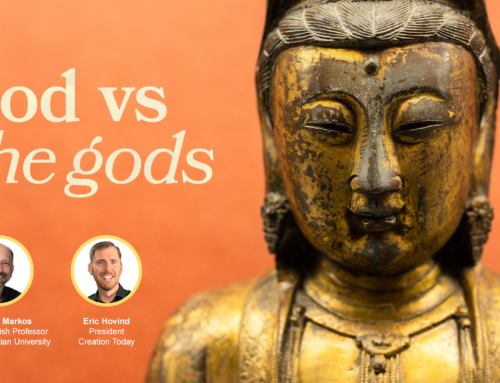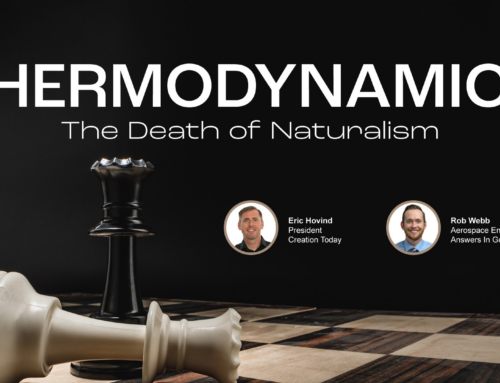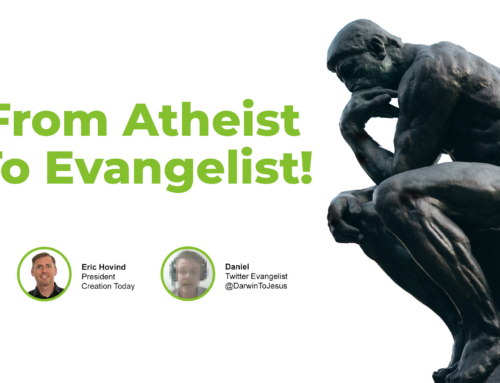I like evidences. Evidences can build up the faith, if used correctly. They help us to confirm that, given our belief that the Bible is true, we can view the world successfully through biblical “glasses” and make sense of what we observe.
Help — I’m losing my faith!
I frequently get emails of the following type: “Someone has given me some evidence about …, which seems to confirm that evolution is true, or creation is wrong. Help — this is damaging my faith!”
With respect, I need to say to such people that your faith is misplaced if it can be damaged by “evidence.” You see, evidences are not neutral. They are interpreted by our worldviews. You might be interested to know that the Bible actually has something to say about the correct use of evidence. You can find the relevant passage in Hebrews 11:1-3.
Now faith is the substance of things hoped for, the evidence of things not seen. For by it the elders obtained a good report. Through faith we understand that the worlds were framed by the word of God, so that things which are seen were not made of things which do appear (emphasis mine).
What is the evidence? It is faith. Faith is not a blind belief system, in the teeth of the evidence. Faith actually IS the evidence. It is therefore by faith that I know that God made the world. Therefore, no evidence will ever shake my faith, regardless of how “scientific” it appears to be, because the actual evidence is my faith. And remember that the apostle Paul says that even faith is “not of yourselves; it is the gift of God” (Ephesians 2:8).
Evidence should not shake our faith
The plea for evidence is therefore often misdirected. We do not require scientific evidence to “prove” the existence of God, or justify our belief that what the Bible says is true. Our faith is the evidence for that. The Bible does not attempt to prove the existence of God. The Bible does not begin with a High School essay, rehearsing the arguments for, with the arguments against, before reaching a conclusion. The Bible starts with the very clear presupposition that “In the beginning, God …” The only discussion in the Bible on the possible non-existence of God is found in Psalm 14 and repeated in Psalm 53: “The fool has said in his heart ‘There is no God’.” In fact, the whole message of Romans 1 is that there is really no such thing as an atheist. They all know that God exists, but suppress this truth in unrighteousness.
Evidence is not for the purpose of “proving” God or the Bible
If supposed evidence should not shake your faith, we can also say that offering evidence is the wrong way to “prove” the Bible to be true. Evidence is presented in court. It is presented to the judge. So if you offer evidence, with the intention of proving to someone else that the Bible is true or that God is real, you are making that skeptic into the judge, and you are putting God and/or the Bible on trial. So that is not what evidence is for. Evidence is there for the believer, to show that their position is consistent. We can demonstrate that evidence is consistent with what we find in Scripture. But evidence is not there to “prove” the Bible. The Bible is true, because it is the Bible — period!
Conclusion
The approach to evidence that I am outlining here will require a complete paradigm-shift for some of you. I had to go through this myself. So much of my creation ministry involved presenting evidences. But evidential apologetics has two main flaws: 1. It doesn’t work, even though we think it ought to. And 2. It is actually unbiblical, because it attempts to put God on trial. For these reasons, here at the Creation Today ministry, we advocate the presuppositional apologetics approach. Keep your eye on our website for news about Eric Hovind’s important and ground-breaking new DVD series, “The Proof of God,” which will give more detail on this presuppositional approach to creationism. And if you want to donate to help with our production of this project, please follow the links to our donations page. In the meantime, check out The Ultimate Proof of Creation, by Dr. Jason Lisle of Answers in Genesis, which also outlines the approach that we recommend.






